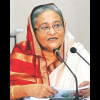Break this cycle of violence
Concerned over the recent spate of attacks on various targeted groups, the European Union yesterday raised the question of security in Bangladesh and urged the government to break this cycle of violence by bringing the perpetrators to justice.
Heads of Mission of the European Union resident in Bangladesh made the call at a meeting with Foreign Minister AH Mahmood Ali at the State Guesthouse Padma.
Referring to the attacks targeting innocent people, including bloggers, religious minorities, human rights activists, law enforcers and foreigners, the EU envoys said, “These attacks constitute an unprecedented threat to human rights and freedom of expression and belief.”
These might taint the international reputation of Bangladesh as an open and tolerant society and the stability and prosperity of the country, they said in a joint statement issued after the meeting.
Pierre Mayaudon, ambassador, EU delegation to Bangladesh, led the EU diplomats. State Minister for Foreign Affairs Shahriar Alam and acting foreign secretary Mizanur Rahman accompanied the minister.
Heads of mission of the UK, Denmark, Sweden, France, Italy, Germany, Spain and the Netherlands attended the meeting. Most of them expressed grave concern over the security situation here and systematic assaults on minorities, secular bloggers, intellectuals and foreigners.
In response, the foreign minister briefed them on the actions taken and the progress achieved by the government in maintaining law and order and ensuring public safety in the aftermath of the killings.
During the initial investigation, it appeared that the Jamaat-e-Islami and Jamaat affiliated outfits like Jamaatul Mujahideen Bangladesh (JMB), Ansar Al Islam, Ansarullah Bangla Team, Harkatul Jihad al Islami (Huji-B), Hizb ut-Tahrir Bangladesh, and newly emerged Al Mujahid were involved in the killings, the minister said.
He added that it was unfortunate the BNP was giving shelter and support to them.
The overall law and order situation in the country is stable and peaceful, Mahmood Ali claimed.
The EU Heads of Mission expressed their conviction that there must be an effective and comprehensive response to militancy, which would include promoting democratic accountability, freedom of expression, vibrant media, tolerance and the empowerment of civil society.
They offered to strengthen their partnership and cooperation with Bangladesh to combat terrorism, of which Europe is also a target.
The EU diplomats also reiterated their opposition to the death penalty in all cases and under any circumstances.
The foreign minister recalled the European Parliament's resolution on Bangladesh in January 2014, saying, “…believes that in the interest of Bangladesh's future, parties having a democratic reputation need to develop a culture of mutual respect; urges the BNP to unequivocally distance itself from Jamaat- e-Islami and Hefazat-e-Islam.”
Mahmood said he was disappointed that the BNP had not dissociated itself from those parties, according to a foreign ministry press release.
He said some vested groups were out to destabilise the country through targeted, pre-mediated and clandestine killings tarnishing the image of Bangladesh and to discredit the government both at home and abroad.
The foreign minister reiterated the government's “zero tolerance” to terrorism and violent extremism and firm commitment to containing violence and ensuring protection and safety of all.
Tracing back similar killings in history, he said in 1971 Jamaat and its various killing outfits, including Al Badar, Razakar and Al-Shams collaborated with the Pakistan Army in killing innocents in the then East Pakistan.
He termed baseless a statement by the Pakistan advisor for foreign affairs that Bangladesh has been conducting the trial of war crimes, violating the tripartite agreement between Bangladesh, India and Pakistan.
The agreement referred only to 195 prisoners of war who had been taken into custody for heinous crimes, including crime against humanity, the foreign minister explained.

 For all latest news, follow The Daily Star's Google News channel.
For all latest news, follow The Daily Star's Google News channel. 







Comments